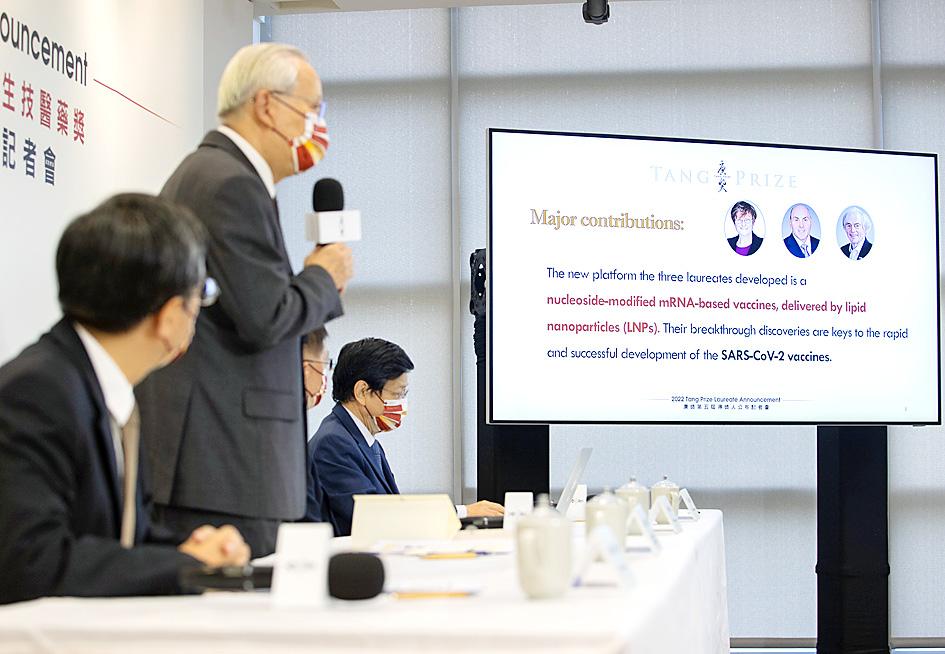Three scientists whose research laid the foundation for messenger RNA (mRNA) COVID-19 vaccines were named the winners of the 2022 Tang Prize in Biopharmaceutical Science at a ceremony in Taipei yesterday.
Katalin Kariko, Drew Weissman and Pieter Cullis were recognized “for the discovery of key vaccinology concepts and approaches, leading to the successful development of mRNA-based COVID-19 vaccines,” the Tang Prize Foundation said.
The technologies developed by the three laureates “not only revolutionized vaccinology, but also signaled a paradigm shift in protein therapy. They represent the advent of a new era of RNA-based therapies,” the foundation said.

Photo: CNA
Kariko and Weissman, who have worked together for more than two decades, created a modified version of mRNA that would not cause an inflammatory response when injected into the body. The technology is used in the Pfizer-BioNTech and Moderna COVID-19 vaccines.
Cullis is a pioneer in delivery systems for mRNA to human cells, based on lipid nanoparticles, which are bubbles of fat that wrap around and protect mRNA.
In a recorded video, Kariko said she was honored and humbled to learn that she had received the award along with Weissman and Cullis.
Weissman said a shared interest in science, a hunger for learning and perseverance formed the foundation of his partnership with Kariko.
Cullis credited his collaborators and colleagues for the award.
“The award is really being given for the work of literally hundreds of people that I’ve had the pleasure to work with over the last 40 years, so it’s really fantastic,” he said.
The three also credited curiosity, collaboration and finding joy in their work as critical to their efforts in the research.
Kariko is an adjunct professor at the University of Pennsylvania and a senior vice president at BioNTech. She was born in Hungary and moved to the US after obtaining a doctorate in biochemistry.
Weissman, a US researcher, is the director of vaccine research at the University of Pennsylvania Perelman School of Medicine.
Cullis is a professor of biochemistry and molecular biology at the University of British Columbia. The Canadian researcher has cofounded several companies, including Integrated Nano Therapeutics, Molecular You and Acuitus Therapeutics.
The Tang Prize is a biennial award established in 2012 by Taiwanese entrepreneur Samuel Yin (尹衍樑), chairman of the Ruentex Group, to honor people who have made prominent contributions in four categories: sustainable development, biopharmaceutical science, Sinology and rule of law.
The winners in each category share a cash award of NT$40 million (US$1.35 million) and NT$10 million in research funding.

The inspection equipment and data transmission system for new robotic dogs that Taipei is planning to use for sidewalk patrols were developed by a Taiwanese company, the city’s New Construction Office said today, dismissing concerns that the China-made robots could pose a security risk. The city is bringing in smart robotic dogs to help with sidewalk inspections, Taipei Deputy Mayor Lee Ssu-chuan (李四川) said on Facebook. Equipped with a panoramic surveillance system, the robots would be able to automatically flag problems and easily navigate narrow sidewalks, making inspections faster and more accurate, Lee said. By collecting more accurate data, they would help Taipei

TAKING STOCK: The USMC is rebuilding a once-abandoned airfield in Palau to support large-scale ground operations as China’s missile range grows, Naval News reported The US Marine Corps (USMC) is considering new sites for stockpiling equipment in the West Pacific to harden military supply chains and enhance mobility across the Indo-Pacific region, US-based Naval News reported on Saturday. The proposed sites in Palau — one of Taiwan’s diplomatic allies — and Australia would enable a “rapid standup of stored equipment within a year” of the program’s approval, the report said, citing documents published by the USMC last month. In Palau, the service is rebuilding a formerly abandoned World War II-era airfield and establishing ancillary structures to support large-scale ground operations “as China’s missile range and magazine

A 72-year-old man in Kaohsiung was sentenced to 40 days in jail after he was found having sex with a 67-year-old woman under a slide in a public park on Sunday afternoon. At 3pm on Sunday, a mother surnamed Liang (梁) was with her child at a neighborhood park when they found the man, surnamed Tsai (蔡), and woman, surnamed Huang (黃), underneath the slide. Liang took her child away from the scene, took photographs of the two and called the police, who arrived and arrested the couple. During questioning, Tsai told police that he had met Huang that day and offered to

A British man was arrested for attempting to smuggle 14.37kg of marijuana into Taiwan through Taiwan Taoyuan International Airport, Taipei Customs said late yesterday. The man, who arrived from Bangkok at 9pm on Friday, was asked by customs officers to open his luggage during a random inspection, Taipei Customs said in a news release. The passenger, whose identity was not disclosed, refused to open his suitcase and tried to flee the restricted area. He was eventually subdued by three customs officials and an Aviation Police Bureau officer. A later search of his checked luggage uncovered 14.37kg of marijuana buds. The case was handed over